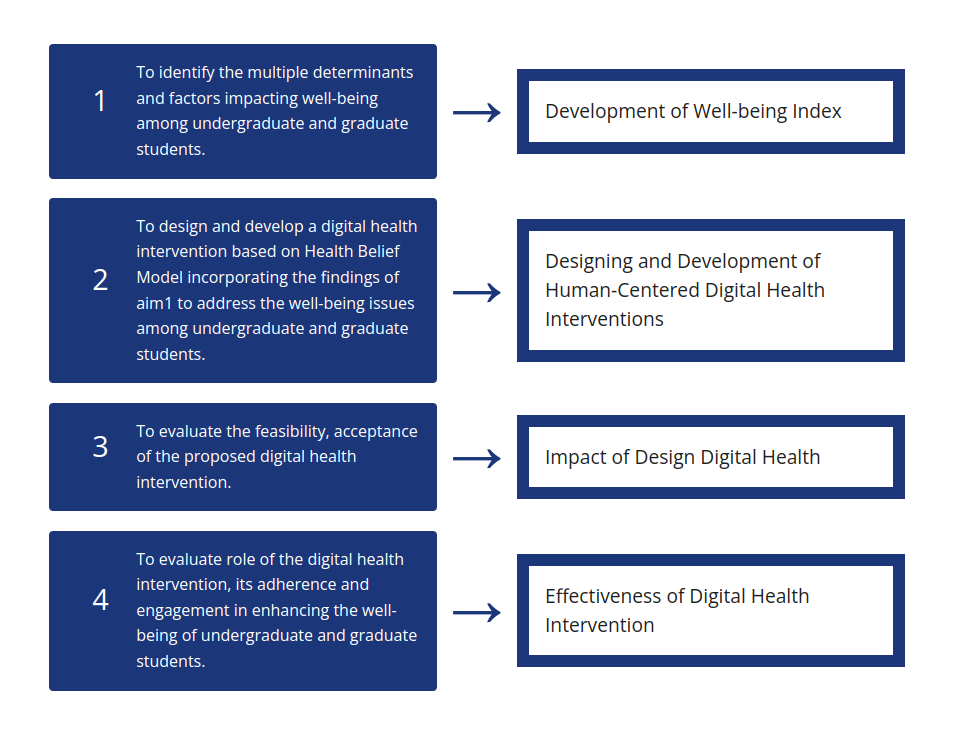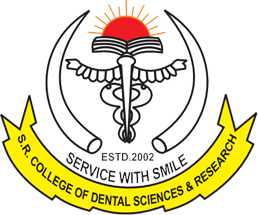Design, Develop and Pilot-Test a Digital Platform to Enhance Student Well-Being: A Mixed-Methods Study
Aim
The aim of the study is to design, develop and pilot test a digital health platform to enhance student well-being.
Objectives

Methods
Objectives
Methods
Outcome
To identify the multiple determinants impacting dimensions of well-being among undergraduate graduate students
Pre-defined questionnaire validated tools to identify multiple determinants affecting the well-being.
Development of Well being Index
To design and develop an interactive digital intervention for various dimensions of well-being
Determinants from the objective 1 & 2 FGDs per site.
Design development of Human Centered Digital Health Interventions
To evaluate the feasibility and acceptance of digital health intervention and their role to enhance the well-being of undergraduate and graduate students.
A randomised control trial: Intervention group-mobile web-based platform with tailored well-being related education.
Acceptability of Digital Health
To evaluate the role of digital health intervention ,its adhereance and engagement in enhancing the well-being of undergraduate and graduate students.
A randomised control trial: Intervention group-mobile web-based platform with tailored well-being related education.
Effectiveness of Digital Health Intervention
Methodology
Visual Representation of Study Objectives and Outcomes

Sample Size
| College | Sample Size | Number Collected Till Date | Last Update Date |
|---|---|---|---|
| Panimalar Medical College Hospital & Research Institute, Varadharajapuram, Poonamallee, Chennai, Tamil Nadu | 2500 | 734 | Updated on : 22 Jan,2026 |
| Government Doon Medical College, Patel Nagar, Dehradun, Uttarakhand | 1020 | 1046 | Updated on : 22 Jan,2026 |
| Sudha Rustagi College of Dental Sciences and Research | 500 | 539 | Updated on : 22 Jan,2026 |
Sites

Panimalar Medical College Hospital & Research Institute
Varadharajapuram, Poonamallee, Chennai, Tamil Nadu- 600123, India

Government Doon Medical College
Patel Nagar, Dehradun, Uttarakhand- 248001, India

Foundation of Healthcare Technologies Society
321, 322 & 323 Third floor, Somdatt Chamber 2, 9 Bhikaji Cama Place, New Delhi, Delhi 110066, India

Sudha Rustagi College of Dental Sciences and Research
Sector 89 Kheri More, Greater Faridabad – 121002
Eligibility
Inclusion criteria
- The eligible study participants will be 18 years older.
- Enrolled in one of the colleges: Government Doon Medical College (GDMC), Patel Nagar, Dehradun, Uttarakhand, Panimalar Medical College Hospital & Research Institute, Varadharajapuram, Poonamallee, Chennai, Tamil Nadu, Sudha Rustagi College of Dental Sciences and Research.
- Having access to Wi-Fi/internet-enabled devices and being willing to give consent to participate in the study.
Exclusion criteria
- Participants less than 18 years older.
- Not enrolled in the institute.
- Involuntary consent will be excluded from the study.
Project Outcomes
The study will help to identify multiple determinants affecting well-being of undergraduate and graduate students.
Explore the role of digital health interventions to enhance the good health and well-being of undergraduate and graduate students.
Help in designing and developing individualized, tailored and interactive internet-enabled digital health interventions to manage well-being of undergraduate and graduate students.
Project execution steps

Data Gathering Tools
Socio-demographic profile
The socio-demographic details of the participant will be collected using self-administered questionnaire.
1. Health Status Profile
- Body mass index
Sarwer D, Polonsky HM. The psychosocial burden of obesity. Endocrinol Metab Clin North Am. Sep
2016;45(3):677-688.
[FREE Full text]
[CrossRef]
[Medline]
2. Familiarity With Technology
- Access to desktop, mobile phones
- Type of phone possessed
- Knowledge of texting
- Access to and familiarity with the internet
3. Health Behavior
- Consumption of tobacco
- Use of alcohol
- Smoking
- Sleep duration
4. Residential Status
- Residential status
- Prior education of the students (within the city or outside the city)
Well-being
1. General Self-Efficacy Scale
It will be evaluated through the General self-efficacy scale. It is a 10-item scale to assess the ability to cope with the daily challenging demands or situations in life.The General Self [Internet]. Fu-berlin.de. 2023 [cited 2023 Jun 30]. Available from:
http://userpage.fu-berlin.de/health/engscal.htm
2. Multi-Dimensional Scale Of Perceived Social Support (MSPSS)
Multi-dimensional Scale of perceived social support will be used to collect the data. It includes sub-scales of support from family, friends, and significant others to assess the perceived social support.Multidimensional Scale of Perceived Social Support (MSPSS) | Measures Library [Internet]. Miami.edu. 2023 [cited 2023 Jun 30]. Available from: https://elcentro.sonhs.miami.edu/research/measures-library/mspss/index.html
3. Perceived Stress Scale
The Perceived Stress Scale (PSS) is the most commonly used psychological instrument for assessing stress perception. It is a measure of how stressful conditions are perceived to be.Cohen S. PERCEIVED STRESS SCALE [Internet]. 1994. Available from:
https://www.mindgarden.com/documents/PerceivedStressScale.pdf
4. WHO-Five Well-Being Index (WHO-5)
The scale assesses subjective psychological well-being5. Brief Resilience Scale
The scale contains behavioural response to stress to assess the perceived ability to bounce back or recover from stress6. Well-Being Locus of Control Scale
It is a scale containing a series of statements of people’s beliefs that their health was or was not determined by their own behavior.Ethics Approval
Panimalar Medical College Hospital & Research Institute, Varadharajapuram, Poonamallee, Chennai, Tamil Nadu Ethical committee approved the study in April 2023 with approval number PMCHRI-IHEC-071.
Government Doon Medical College, Patel Nagar, Dehradun, Uttarakhand Institutional Ethical committee approved the study on April 2023 with approval number GDMC/IEC/2023/36 .
Sudha Rustagi College of Dental Sciences and Research, Greater, Faridabad, Haryana Institutional Ethical committee approved the study in May 2025 with approval number SRCDSR/IEC/2025/150.
Aim
The aim of the study is to design, develop and pilot test a digital health platform to enhance student well-being.
Objectives

Study Design
Mixed methods Research
Qualitative Research
Qualitative research can be defined as the study of the nature of phenomena and is especially appropriate for answering questions of why something is (not) observed, assessing complex multi-component interventions, and focussing on intervention improvement.
Quantitative Research
Quantitative research focuses on numeric and unchanging data and detailed, convergent reasoning rather than divergent reasoning. It deals in numbers, logic, and an objective stance.
Study Sites

Panimalar Medical College Hospital & Research Institute
Varadharajapuram, Poonamallee, Chennai, Tamil Nadu- 600123, India

Government Doon Medical College
Patel Nagar, Dehradun, Uttarakhand- 248001, India

Foundation of Healthcare Technologies Society
321, 322 & 323 Third floor, Somdatt Chamber 2, 9 Bhikaji Cama Place, New Delhi, Delhi 110066, India
Study Methods
Objectives
Methods
Outcome
To identify the multiple determinants impacting dimensions of well-being among undergraduate graduate students
Pre-defined questionnaire validated tools to identify multiple determinants affecting the well-being.
Development of Well being Index
To design and develop an interactive digital intervention for various dimensions of well-being
Determinants from the objective 1 & 2 FGDs per site.
Design development of Human Centered Digital Health Interventions
To evaluate the feasibility and acceptance of digital health intervention and their role to enhance the well-being of undergraduate and graduate students.
A randomised control trial: Intervention group-mobile web-based platform with tailored well-being related education.
Acceptability of Digital Health
To evaluate the role of digital health intervention ,its adhereance and engagement in enhancing the well-being of undergraduate and graduate students.
A randomised control trial: Intervention group-mobile web-based platform with tailored well-being related education.
Effectiveness of Digital Health Intervention
Study Methodology
Visual Representation of Study Objectives and Outcomes

Sample Size
| College | Sample Size | Number Collected Till Date | Last Update Date |
|---|---|---|---|
| Panimalar Medical College Hospital & Research Institute, Varadharajapuram, Poonamallee, Chennai, Tamil Nadu | 2500 | February 2025 | 6 March 2025 |
| Government Doon Medical College, Patel Nagar, Dehradun, Uttarakhand | 1020 | February 2025 | 6 March 2025 |
Study Eligibility
Inclusion criteria
- The eligible study participants will be 18 years older.
- Enrolled in one of the colleges: Government Doon Medical College (GDMC), Patel Nagar, Dehradun, Uttarakhand, Panimalar Medical College Hospital & Research Institute, Varadharajapuram, Poonamallee, Chennai, Tamil Nadu.
- Having access to Wi-Fi/internet-enabled devices and being willing to give consent to participate in the study.
Exclusion criteria
- Participants less than 18 years older.
- Not enrolled in the institute.
- Involuntary consent will be excluded from the study.
Proposed Outcomes
The study will help to identify multiple determinants affecting well-being of undergraduate and graduate students.
Explore the role of digital health interventions to enhance the good health and well-being of undergraduate and graduate students.
Help in designing and developing individualized, tailored and interactive internet-enabled digital health interventions to manage well-being of undergraduate and graduate students.
Intervention

Study Variables
The socio-demographic details of the participant will be collected using self-administered questionnaire.
1. Health Status Profile
- Body mass index
Sarwer D, Polonsky HM. The psychosocial burden of obesity. Endocrinol Metab Clin North Am. Sep 2016;45(3):677-688.
[FREE Full text]
[CrossRef]
[Medline]
2. Familiarity With Technology
- Access to desktop, mobile phones
- Type of phone possessed
- Knowledge of texting
- Access to and familiarity with the internet
3. Health Behavior
- Consumption of tobacco
- Use of alcohol
- Smoking
- Sleep duration
4. Residential Status
- Residential status
- Prior education of the students (within the city or outside the city)
1. General Self-Efficacy Scale
It will be evaluated through the General self-efficacy scale. It is a 10-item scale to assess the ability to cope with the daily challenging demands or situations in life.The General Self [Internet]. Fu-berlin.de. 2023 [cited 2023 Jun 30]. Available from:
http://userpage.fu-berlin.de/health/engscal.htm
2. Multi-Dimensional Scale Of Perceived Social Support (MSPSS)
Multi-dimensional Scale of perceived social support will be used to collect the data. It includes sub-scales of support from family, friends, and significant others to assess the perceived social support.Multidimensional Scale of Perceived Social Support (MSPSS) | Measures Library [Internet]. Miami.edu. 2023 [cited 2023 Jun 30]. Available from: https://elcentro.sonhs.miami.edu/research/measures-library/mspss/index.html
3. Perceived Stress Scale
The Perceived Stress Scale (PSS) is the most commonly used psychological instrument for assessing stress perception. It is a measure of how stressful conditions are perceived to be.Cohen S. PERCEIVED STRESS SCALE [Internet]. 1994. Available from:
https://www.mindgarden.com/documents/PerceivedStressScale.pdf
4. WHO-Five Well-Being Index (WHO-5)
The scale assesses subjective psychological well-being5. Brief Resilience Scale
The scale contains behavioural response to stress to assess the perceived ability to bounce back or recover from stress6. Well-Being Locus of Control Scale
It is a scale containing a series of statements of people’s beliefs that their health was or was not determined by their own behavior.Ethics Approval
Panimalar Medical College Hospital & Research Institute, Varadharajapuram, Poonamallee, Chennai, Tamil Nadu Ethical committee approved the study in April 2023 with approval number PMCHRI-IHEC-071.
Government Doon Medical College, Patel Nagar, Dehradun, Uttarakhand Institutional Ethical committee approved the study on April 2023 with approval number GDMC/IEC/2023/36 .
